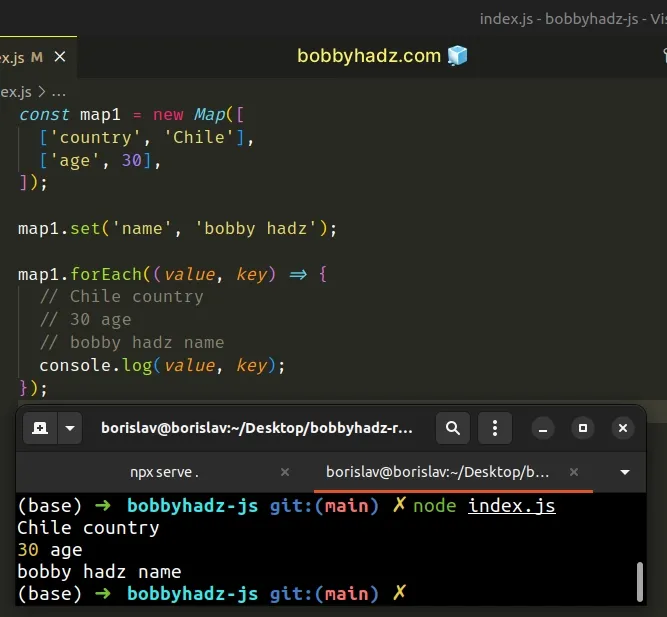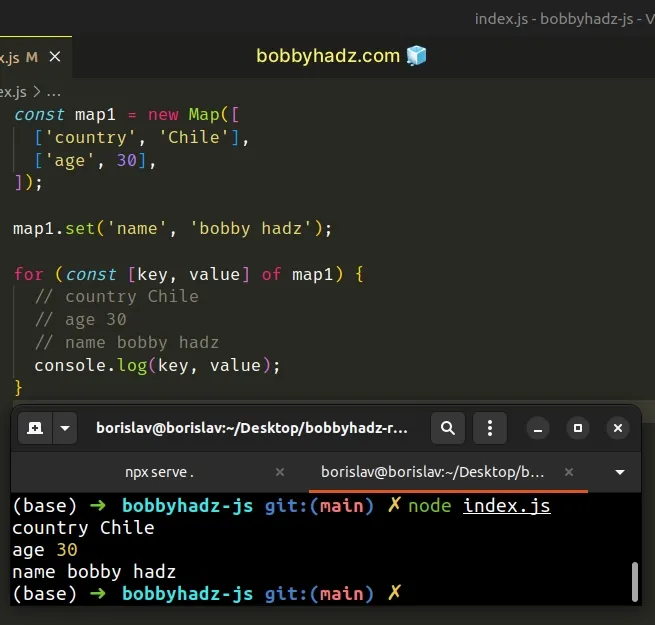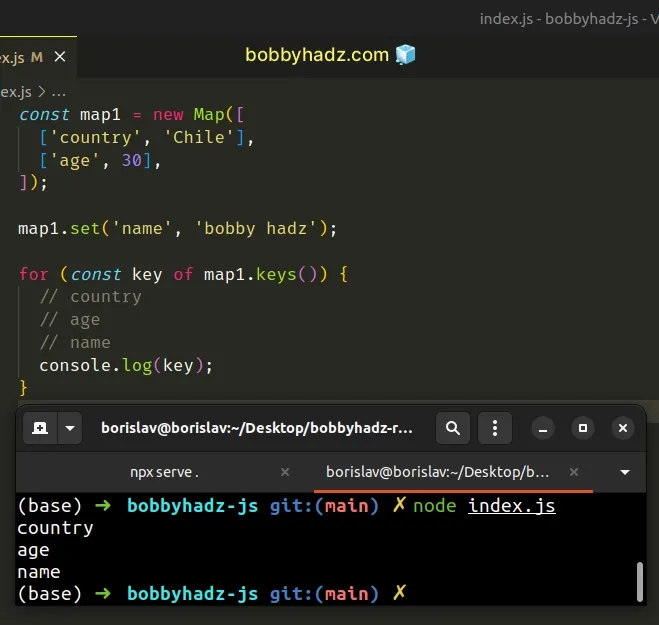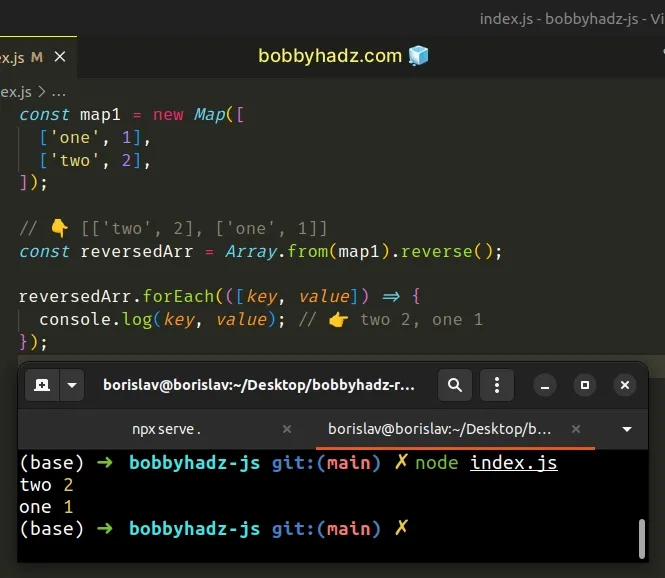How to iterate through a Map object in JavaScript
Last updated: Mar 3, 2024
Reading time·4 min

# Table of Contents
# Iterate through a Map object in JavaScript
Use the Map.forEach() method to iterate through a Map object.
The forEach method takes a function that gets invoked for each key-value
pair in the Map in insertion order.
const map1 = new Map([ ['country', 'Chile'], ['age', 30], ]); map1.set('name', 'bobby hadz'); map1.forEach((value, key) => { // Chile country // 30 age // bobby hadz name console.log(value, key); });

The function we passed to the
Map.forEach()
method gets called for each key-value pair in the Map object.
The function gets passed 3 arguments on each iteration:
- the
valueof the current iteration - the
keyof the current iteration - the
Mapobject that is being iterated
The Map.forEach() method returns undefined.
# Iterate through a Map object using a for...of loop
Alternatively, you can use a for...of loop.
The for...of loop assigns the key and the value of the current iteration to
variables.
const map1 = new Map([ ['country', 'Chile'], ['age', 30], ]); map1.set('name', 'bobby hadz'); for (const [key, value] of map1) { // country Chile // age 30 // name bobby hadz console.log(key, value); }

The for...of statement is
used to loop over iterable objects like arrays, strings, Map, Set and
NodeList objects and generators.
We used destructuring assignment to
assign the key and value variables.
const [key, value] = ['country', 'Chile']; console.log(key); // 👉️ country console.log(value); // 👉️ Chile
The for...of loop might be your preferred approach if you have to use the
break keyword to exit the loop prematurely.
Using the break keyword is not supported in the forEach() method.
# Iterating over the Keys or Values of a Map object
This is a two-step process:
- Use the
Map.keys()method to get an iterator object of the Map's keys. - Use the
Map.values()method to get an iterator object of the Map's values. - Use a
for...ofloop to iterate over the keys or values.
const map1 = new Map([ ['country', 'Chile'], ['age', 30], ]); map1.set('name', 'bobby hadz'); for (const key of map1.keys()) { // country // age // name console.log(key); }

If you need to iterate over the Map object's values, use the Map.values()
method.
const map1 = new Map([ ['country', 'Chile'], ['age', 30], ['name', 'bobby hadz'], ]); for (const key of map1.values()) { // Chile // 30 // bobby hadz console.log(key); }
The Map.keys method returns an iterator object of the Map's keys.
const map1 = new Map([ ['country', 'Chile'], ['age', 30], ['name', 'bobby hadz'], ]); // 👇️ [Map Iterator] { 'country', 'age', 'name' } console.log(map1.keys()); // 👇️ [Map Iterator] { 'Chile', 30, 'bobby hadz' } console.log(map1.values());
The Map.values() method returns an iterator object of the Map's values.
The for...of loop is useful when you need to exit the loop prematurely if a
certain condition is met.
const map1 = new Map([ ['country', 'Chile'], ['age', 30], ['name', 'bobby hadz'], ]); for (const value of map1.values()) { console.log(value); if (value === 'Chile') { break; } }
If the condition in the if statement is met, the break statement exits the
for...of loop.
Note that the return values of the Map.keys() and Map.values() methods are
not arrays, they are iterator objects.
You can use the Array.from method if you
want to convert the Map's values or keys to an array, e.g. to be able to use the
forEach method.
const map1 = new Map([ ['country', 'Chile'], ['age', 30], ]); // 👇️️ ['country, 'age'] const keys = Array.from(map1.keys()); // 👇️️ ['Chile', 30] const values = Array.from(map1.values());
You can also use the spread syntax (...) to unpack the values from the iterator object into an array.
const map1 = new Map([ ['country', 'Chile'], ['age', 30], ]); const keys = [...map1.keys()]; // 👉️ ['country, 'age'] const values = [...map1.values()]; // 👉️ ['Chile', 30]
The last 2 examples achieve the same result. They both convert the iterator objects to arrays.
# Iterate over a Map in Reverse Order
To iterate over a Map in reverse order:
- Use the
Array.from()method to convert theMapto an array. - Use the
reverse()method to reverse the array. - Use the
forEach()method to iterate over the reversed array.
const map1 = new Map([ ['one', 1], ['two', 2], ]); // 👇️ [['two', 2], ['one', 1]] const reversedArr = Array.from(map1).reverse(); reversedArr.forEach(([key, value]) => { console.log(key, value); // 👉️ two 2, one 1 });

The first step is to convert the Map to an array.
const map1 = new Map([ ['one', 1], ['two', 2], ]); // 👇️ [['one', 1], ['two', 2]] const arr = Array.from(map1);
We used the Array.reverse() method to reverse the array.
const map1 = new Map([ ['one', 1], ['two', 2], ]); // 👇️ [['one', 1], ['two', 2]] const arr = Array.from(map1); // 👇️ [['two', 2], ['one', 1]] const reversed = arr.reverse();
reverse() method reverses the array in place and returns the result.You can use the Array.forEach method to iterate over the reversed array.
The function we passed to the forEach method gets called with each element of
the array.
We used destructuring assignment to
assign the key and value variables.
const [key, value] = ['one', 1]; console.log(key); // 👉️ "one" console.log(value); // 👉️ 1
You can also use the
spread syntax (...) to
convert the Map to an array.
const map1 = new Map([ ['one', 1], ['two', 2], ]); // 👇️ [['two', 2], ['one', 1]] const reversedArr = [...map1].reverse(); reversedArr.forEach(([key, value]) => { console.log(key, value); // 👉️ two 2, one 1 });
This code sample achieves the same result, however, this time we used the spread
syntax (...) to unpack the key-value pairs of the Map into an array.
In some very rare cases, the spread syntax (...) doesn't play nice when using
TypeScript. This issue doesn't occur when using Array.from().
# Additional Resources
You can learn more about the related topics by checking out the following tutorials:
- How to sort a Map in JavaScript
- Get the Sum of all Values in a Map using JavaScript
- How to update a Value in a Map in JavaScript
- How to merge Maps in JavaScript or TypeScript
- How to Initialize a Map with Values in JavaScript
- Increment a Value in an Object or a Map in JavaScript
- How to Zip two or more Arrays in JavaScript - Complete Guide
- How to iterate over a FileList in JavaScript [5 Ways]
- Resource interpreted as stylesheet but transferred with MIME type text/html
- Iterate over all keys stored in localStorage in JavaScript

